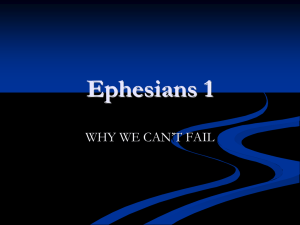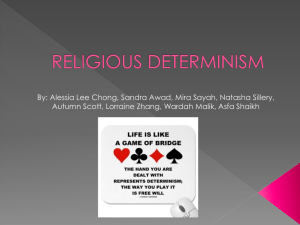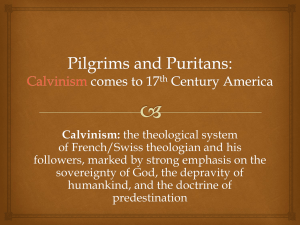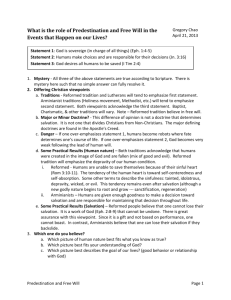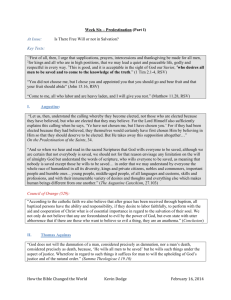Sermon, All Souls`, July 27 2009
advertisement
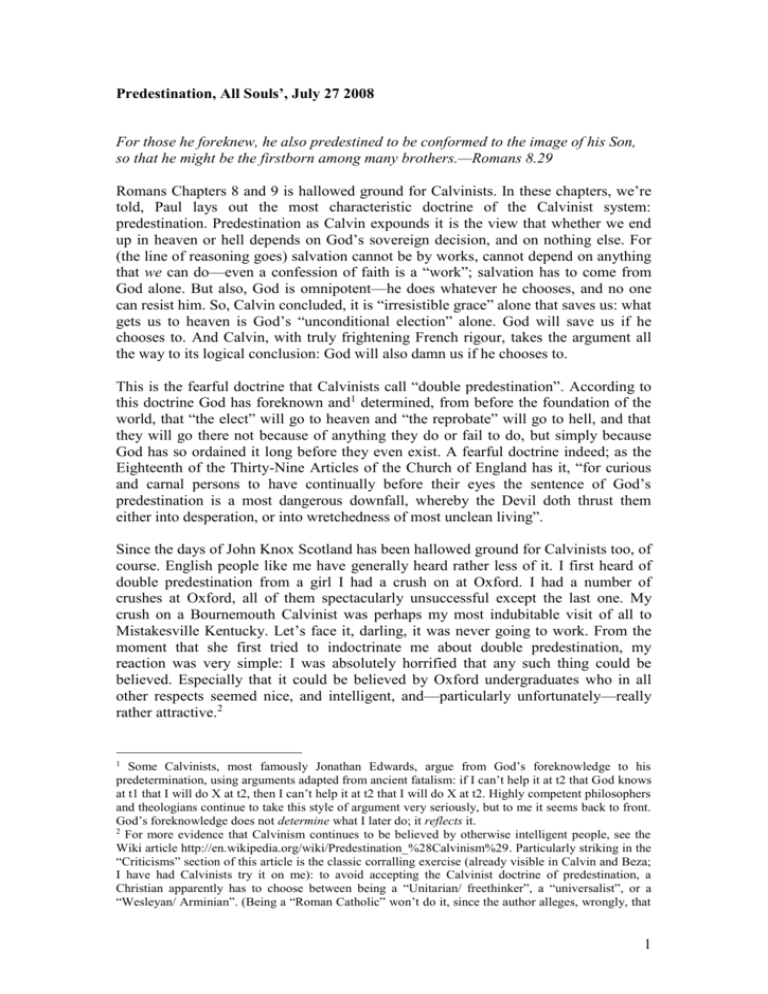
Predestination, All Souls’, July 27 2008 For those he foreknew, he also predestined to be conformed to the image of his Son, so that he might be the firstborn among many brothers.—Romans 8.29 Romans Chapters 8 and 9 is hallowed ground for Calvinists. In these chapters, we’re told, Paul lays out the most characteristic doctrine of the Calvinist system: predestination. Predestination as Calvin expounds it is the view that whether we end up in heaven or hell depends on God’s sovereign decision, and on nothing else. For (the line of reasoning goes) salvation cannot be by works, cannot depend on anything that we can do—even a confession of faith is a “work”; salvation has to come from God alone. But also, God is omnipotent—he does whatever he chooses, and no one can resist him. So, Calvin concluded, it is “irresistible grace” alone that saves us: what gets us to heaven is God’s “unconditional election” alone. God will save us if he chooses to. And Calvin, with truly frightening French rigour, takes the argument all the way to its logical conclusion: God will also damn us if he chooses to. This is the fearful doctrine that Calvinists call “double predestination”. According to this doctrine God has foreknown and1 determined, from before the foundation of the world, that “the elect” will go to heaven and “the reprobate” will go to hell, and that they will go there not because of anything they do or fail to do, but simply because God has so ordained it long before they even exist. A fearful doctrine indeed; as the Eighteenth of the Thirty-Nine Articles of the Church of England has it, “for curious and carnal persons to have continually before their eyes the sentence of God’s predestination is a most dangerous downfall, whereby the Devil doth thrust them either into desperation, or into wretchedness of most unclean living”. Since the days of John Knox Scotland has been hallowed ground for Calvinists too, of course. English people like me have generally heard rather less of it. I first heard of double predestination from a girl I had a crush on at Oxford. I had a number of crushes at Oxford, all of them spectacularly unsuccessful except the last one. My crush on a Bournemouth Calvinist was perhaps my most indubitable visit of all to Mistakesville Kentucky. Let’s face it, darling, it was never going to work. From the moment that she first tried to indoctrinate me about double predestination, my reaction was very simple: I was absolutely horrified that any such thing could be believed. Especially that it could be believed by Oxford undergraduates who in all other respects seemed nice, and intelligent, and—particularly unfortunately—really rather attractive.2 Some Calvinists, most famously Jonathan Edwards, argue from God’s foreknowledge to his predetermination, using arguments adapted from ancient fatalism: if I can’t help it at t2 that God knows at t1 that I will do X at t2, then I can’t help it at t2 that I will do X at t2. Highly competent philosophers and theologians continue to take this style of argument very seriously, but to me it seems back to front. God’s foreknowledge does not determine what I later do; it reflects it. 2 For more evidence that Calvinism continues to be believed by otherwise intelligent people, see the Wiki article http://en.wikipedia.org/wiki/Predestination_%28Calvinism%29. Particularly striking in the “Criticisms” section of this article is the classic corralling exercise (already visible in Calvin and Beza; I have had Calvinists try it on me): to avoid accepting the Calvinist doctrine of predestination, a Christian apparently has to choose between being a “Unitarian/ freethinker”, a “universalist”, or a “Wesleyan/ Arminian”. (Being a “Roman Catholic” won’t do it, since the author alleges, wrongly, that 1 1 In my studies at the time I was reading the early Greek philosopher Xenophanes. Human beings, says Xenophanes (DK Fragment 11), “have attributed to the gods everything that is a shame and reproach among mortals—theft and whoring and mutual deceit”. And arbitrary damnation too. A toddler who grouped his toys into two sets, one set for coddling and the other for burning—and indeed, grouped them this way long before he was actually given them—and what’s more, when asked why he had so grouped them, just said “Because that’s my Sovereign Will”—such a toddler would be an excellent candidate for the urgent attention of the nearest child psychiatrist. How much more should we worry about the idea of a God of love behaving like that. God is not a psychotic toddler, destroying some of his toys and saving others just because he feels like it. It is a slander on God to suppose that he could possibly be like this. To be exact, it is blasphemy.3 “Hasn’t the potter the power over the clay—to make from the same lump one pot for honourable purposes, and another for shameful purposes?” the Calvinists will retort, citing scripture to their own purposes (Romans 9.21-22): “What if God, choosing to show his wrath and make his power known, endured with much patience the vessels of wrath, prepared for destruction?” Who are we, they will say, to argue with God? And who are we to argue with scripture when it lays out the doctrine of predestination quite explicitly? I was very put out by these rhetorical questions. It seemed to me a serious possibility that the Bournemouth Calvinists were right. The trouble was that, if they were, I wasn’t sure if I wanted to go on being a Christian at all. If God was like that, then God was utterly repugnant, and I wanted nothing to do with him. Like Ivan in Dostoevsky’s Brothers Karamazov, I felt that if God was the Calvinists’ God, then I’d rather return my ticket. I was so perturbed by all this, in fact, that I went to see the chaplain of my college, Jeffrey John, a man who has since obtained notoriety by being denied a bishopric because for quarter of a century he has respected just about the only hard and fast law that the Church of England nowadays lays down about anything, namely that a gay priest may have a Significant Other, but only celibately. I suppose that may make Jeffrey the first person ever to be refused a bishop’s mitre for keeping a rule of celibacy… one is reminded of Mr Emerson’s marvellous question in A Room With A View, “Is happiness so common in the world that we can shut it out when we find it?”… but I digress. Jeffrey, bless him, imbibed Welsh Calvinism with his mother’s milk (and weaned himself off it almost equally early); and what he pointed out to me was that actually there are good answers to both the Calvinists’ rhetorical questions. Who are we to argue with God? Well, we’re his people, his church, who like all his prophets and disciples, have always whined and grumbled and complained and moaned and wrestled with God, and always will. If it seems to us like God is doing or even allowing something monstrous, then it is entirely right for us to argue with him. Catholics believe in the Calvinist doctrine of predestination too.) But plenty of other descriptions might apply to anti-Calvinist Christians: “orthodox”, for instance. 3 Though to my mind it is not the worst blasphemy or heresy involved in Calvinism. The doctrine of “limited atonement”, i.e. the view that Christ died not for all humanity but only for the elect, is even more outrageous. It is also patently unscriptural. 2 It’s our job to argue with him; that’s what intercession is, or part of it. In the words of one of God’s earliest critics, Abraham, “Shall not the Judge of all the earth do right?” (Genesis 18.25). Or as it was put by one of God’s rather later and rather harsher critics, Voltaire: Dieu pardonnera, c’est son métier. “God will forgive. That’s his job.” And who are we to argue with scripture? Well, actually, there is nothing to argue with. On this score at least we have no argument with scripture, because the idea that the Calvinist doctrine of predestination has the slightest support anywhere in the Bible is simply an illusion. Romans 8-9 does not lay out the Calvinist doctrine, either explicitly or implicitly, nor does any other part of Scripture.4 Let me explain why not. Begin with the word “predestination”. That word is of course not in the original text of Romans, because the original text of Romans is in Greek, and “predestination” is an English word (transliterated from the mediaeval Latin praedestinatio). The relevant Greek verb is proorizein, to mark out beforehand, which entirely lacks the connotations of inevitability that “predestination” gets from having “destine” in the middle of it. To tip a horse in the 230 would be to proorizein it. That would hardly imply that it was the horse’s destiny, or that it was bound, to win the 230. So why is “predestine” there in nearly all the English translations? Largely, I suspect, because of Calvin’s influence on the translators (especially the early ones: the translators of the King James Bible, who set the tone for everyone who followed them, were much more under the Calvinist thumb than almost any biblical scholars are today). So for Calvinists to say that the doctrine of predestination is there in the Bible because the word is there in the Bible is a complete stitch-up. It was the Calvinists who put the word in the Bible in the first place. Then, going a little deeper, look at what St Paul is actually arguing overall in the whole of Romans 8-11. His basic claim is that God has a plan to save everybody: “God has sealed them in (synekleisen) in their unbelief, in order that he might have mercy on (eleêsêi) them all” (Romans 11.32). In particular, Paul is concerned about his own people, the Jews, who (then and now) seem so far from any kind of reconciliation with the Jewish Messiah Jesus. Paul’s thesis about the Jews in Romans 8-11 is not that God has actively predestined them to hell, nor even that he has, by omission, allowed them to be cast off for ever. It is that God has chosen to save the Gentiles first, and then, by saving the Gentiles, to make a way for the Jews to be saved as well, later on in the plan: “If the fall of the Jews is the riches of the world, and the diminishing of the Jews the riches of the Gentiles, how much more their fullness?” (Romans 11.12). So in the end, when all the Gentiles have been saved, “all Israel shall be saved” too (Romans 11.26), perhaps by way of a sense of jealousy of what the Gentiles have got and they haven’t (Romans 11.11). Notice here that Paul is thinking about corporate rather than individual salvation, the salvation of the Jews or the Gentiles as groups or nations not as individuals. (After all, at the individual level, he himself was a Jew, indeed a Pharisee, who’d received the salvation of the Gospel.) This goes directly against the tenor of the Calvinist doctrine In the New Testament apart from Romans, “predestination” talk is actually remarkably rare: Acts 4.28, Ephesians 1.5, 1.11. It is not that common even in Romans; it does not occur at all before Chapter 8. From the Old Testament a few texts in Isaiah can be brought alongside, but little or nothing else. Truly a molehill of evidence from which to build a mountain of monstrous theocratic systematising. 4 3 of predestination, which is in its first application an entirely individualistic doctrine— one of the main sources, indeed, of the evangelical navel-gazing preoccupation with the state of my own private soul that the Scot James Hogg famously parodied in his 1824 Gothic novel The Private Memoirs and Confessions of a Justified Sinner. Paul’s emphasis is not only corporate rather than individual; it is also this-worldly rather than other-worldly. He is not talking about the eternal destiny of the individual soul after death; he’s talking about how God’s plan of salvation for the whole world works out within human history. The hardenings of hearts and blindings of eyes that Paul talks about in Romans 8-11 are certainly brought about by God, but not in order to ensure that particular people get sent off, post mortem, to their pre-booked seats in the relevant circle of heaven or of hell. Rather, they are brought about to ensure that particular groups hear and respond to the gospel in the order and at the time that God intends. So these hardenings and blindings are not final and irrevocable, like Calvin’s predestinings. They are tactical, they are steps along the way to the salvation even of those groups or races or nations whose hearts are hardened or whose eyes are blinded. See this, and the Calvinists’ favourite proof-texts all implode. When Paul supposes that God might make vessels both for honourable purposes and for dishonourable ones, who is he likening to the dishonourable vessels? The Jews, the very people who his main point is to argue will in the end be saved. And these vessels of wrath which seem so ready for destruction—the whole point is that God does not destroy them. The point is that he “endures them with great patience”, so that even they may be saved in the end. So the lesson that we should draw from Romans 8-11 is absolutely nothing like the Calvinist doctrine of predestination. It is the lesson that God has a plan for the world, both at the national or political level, and (no doubt) at the individual level too. Finding out God’s plan for us is finding out the best news there is. It is finding the pearl of great price, or the buried treasure, that Jesus speaks of in today’s gospel reading; it is the yeast that leavens everything else we do. For (to quote again my favourite line from St Augustine) “he made us for himself, and our hearts are restless till they find their rest in him”. That is why another name for “God’s plan for us” is “what we want most in all the world”. God’s plans for each of us, and for nations and for humanity as a whole—these plans may be proorismena, marked out in advance, but they are never (as Calvin taught) as inevitable as “fate” or “destiny”. For they are plans which involve us—and we can and do get our parts in them wrong. God’s plan for us is well-defined and particular enough for it to be true that there is such a thing as missing the boat. It can happen that God intends something to happen, to a nation or to us as individuals, and we fail to take him up on his gracious purposes; we fail to cooperate. And then what will happen? Well, when we fail to respond at what Captain Jack Sparrow would call “the opportune moment” to God’s Plan A, there is real loss: we lose the opportunity to be what God most wants us to be, which is also what we most want to be ourselves. Of course, it can often be that God then graciously substitutes a Plan B. For God is gracious, he is overflowing with generosity and creativity. And one thing that Scripture really does show is God rewriting the script to accommodate our idiocies when we do miss the opportune moment, or when we are involved in the 4 sort of grubby local and tribal chicanery that Jacob and Laban are involved in in today’s Old Testament reading. So missing out on Plan A, as Israel did time and again, and as the church has undoubtedly done ever since Jesus founded it, is worth avoiding: it involves genuine and uncompensatable losses. But God is very patient, and will not stop trying to give us what we really want, however hard we fight to avoid receiving it. In all these ways God is not a bit like the mad sadistic puppet-master that Calvinists take him to be. He is far more like the patient and persistent lover in the book of Hosea, who will not give up on his beloved no matter how perversely she treats him, and no matter how long she goes on insisting that “You and me, darling—it was never going to work”. How about the opposite of “It was never going to work”? For instance when a lover begins to see that an undergraduate crush has the potential to turn into a lifelong happy marriage, and says to his beloved “You and me—it was always meant to be”, we understand perfectly what he means. He does not mean that their love was fatalistically preordained long ago by some remote celestial plan that neither of them has the least say in. He means that their love fits their natures perfectly: that it answers exactly to what they are, what they’ve always been, and what they were made to become. Now that’s what I call predestination. 5
